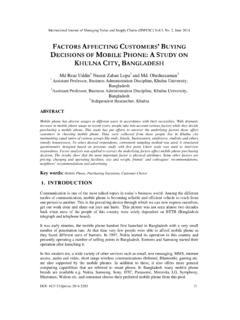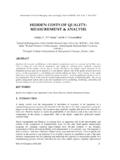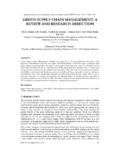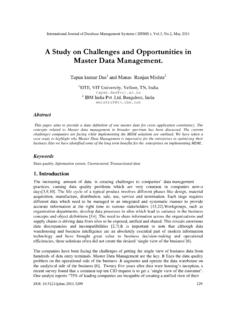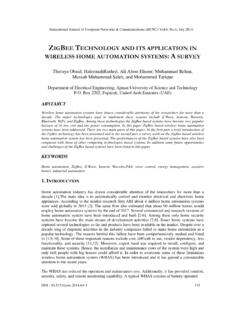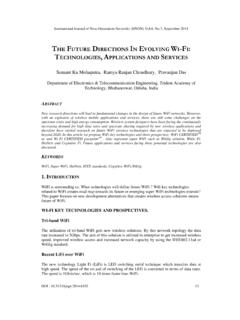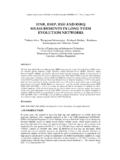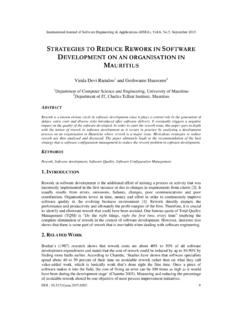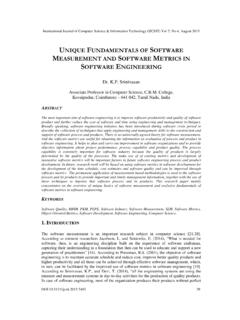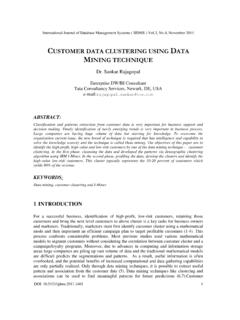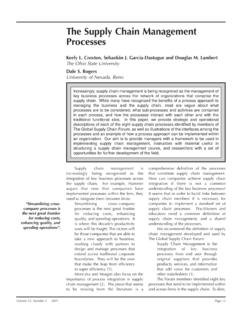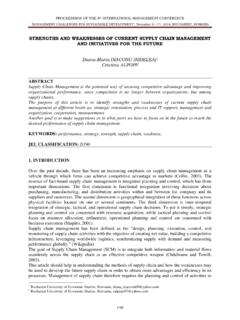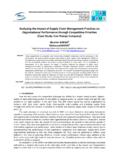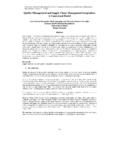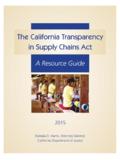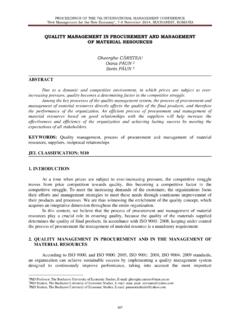Transcription of EFFECT OF SUPPLIER RELATIONSHIP MANAGEMENT ON …
1 international Journal of Managing Value and supply Chains (IJMVSC) Vol. 6, No. 1, March 2015 DOI: 25 EFFECT OF SUPPLIER RELATIONSHIP MANAGEMENT ON THE EFFECTIVENESS OF supply chain MANAGEMENT IN THE KENYA PUBLIC SECTOR. Ondieki John Nyamasege1 and Oteki Evans Biraori2 1 PhD student, Jomo Kenyatta University of Agriculture & Technology, Nairobi, Kenya. 2 PhD student, Jomo Kenyatta University of Agriculture & Technology, Nairobi, Kenya. Abstract The main objective of the study was to assess factors affecting the effectiveness of supply chain MANAGEMENT practices in Kenyan public sector case of Ministry of Finance with the aim of assessing the EFFECT of SUPPLIER RELATIONSHIP on the effectiveness of supply chain MANAGEMENT practices.
2 The study adopted a descriptive case research design with study population of 120 MANAGEMENT staff working at the Ministry of finances procurement, finance and administration departments from which a sample size of 60 respondents was drawn. Questionnaires were used for data collection and descriptive statistics data analysis method was applied to analyze data aided by Statistical Package for Social Sciences. The study identified that lack of SUPPLIER RELATIONSHIP MANAGEMENT strategies lowered the effectiveness of supply chain MANAGEMENT functions. The study recommended application of SUPPLIER collaboration strategies. KEYWORDS Procurement, SUPPLIER and Customer RELATIONSHIP , supply chain MANAGEMENT 1. INTRODUCTION SUPPLIER RELATIONSHIP MANAGEMENT entails determining how company buyers interact with suppliers.
3 It is a mirror image of customer RELATIONSHIP MANAGEMENT . Just as a company needs to develop relationships with its customers, it needs to foster relationships with its suppliers to ensure quality goods and services, timely and assured deliveries and information flow to assist both organizations in planning. At the strategic level, the output of the process is an understanding of the levels of relationships the firm will maintain, and the process for segmenting the suppliers and working with them to develop appropriate relationships. Once the process team determines the criteria for categorization of suppliers and the levels of customization, the operational SUPPLIER RELATIONSHIP MANAGEMENT process develops and manages the RELATIONSHIP . Relationships can take the form of SUPPLIER captive or buyer captive.
4 SUPPLIER applies when the SUPPLIER has less chances of changing the buyer either because of the SUPPLIER having invested a lot of resources to produce a particular product to a given firm and hence moving will be a loss, a case where a SUPPLIER has only one or a few clients to deliver to. Buyer captive arises when the buyer has one source to buy from such as when there is only one SUPPLIER or manufacturer of product. In both cases, relationships should be a win-win to both for both firms to reduce costs and share profits. international Journal of Managing Value and supply Chains (IJMVSC) Vol. 6, No. 1, March 2015 26 Statement of the Problem In Kenya, over seventy percent (70%) of public sector organizations experience supply chain MANAGEMENT challenges and this negatively affects effective delivery of services [24].
5 The ministry of finance was ranked 7th in performance, according to the performance contracting secretariat report. As a strategic ministry in charge of financial policy formulation and implementation in public sector, the ministry was supposed to do better. A case in point is the De La Rue currency printing sager. When a new government was formed in 2003, the then minister for finance cancelled an exclusive 10-year contracts to print Kenyan bank notes because it was allegedly hurriedly awarded. Instead, CBK floated an international tender for printing of 400 million units of new generation currency. The competitive bidding process could not succeed since De La Rue had already established a long working RELATIONSHIP with the CBK. The ministry of finance tabled a policy paper before the cabinet proposing to give De La Rue an exclusive currency printing contract for 10 years and then later acquire 40% of the company shareholding.
6 Many financial experts, more especially in the private sector felt that the contract was skewed towards De La Rue. The matter is a subject to investigation by the public accounts committee. It casts aspersions on the supply chain efficacy of the ministry. In spite of having many SCM studies undertaken by Goldstein[29], Harmon[31], Harrison[32], Peters[15], Martin[24], Edward[45] and Clerk[13], none of the studies have drawn much emphasis on how public sector organizations should improve the effectiveness of the supply chain MANAGEMENT practices. Hence this has created a knowledge gap amongst procurement and logistics practitioners in public sector organizations. 2. LITERATURE REVIEW Lee [39] affirmed that SRM is a discipline of working collaboratively with those suppliers that are vital to the success of your organization to maximize the potential value of that RELATIONSHIP .
7 SRM is about developing two-way, mutually beneficial relationships with your most strategic supply partners that deliver greater levels of innovation and competitive advantage than could be achieved by operating independently. Peters [55] argued that SRM managers should be responsible for managing no more than three SUPPLIER relationships, in order to devote sufficient time to each. Staff involved in SRM activities will have a good combination of commercial, technical and interpersonal skills. Commercial acumen, market knowledge, analytical abilities and project MANAGEMENT expertise are important. But softer skills around communication, listening, influencing and managing change are critical to developing strong and trusting working relations. SRM managers understand their suppliers business and strategic goals and are able to see issues from the SUPPLIER s point of view, while balancing this with their own organization s requirements and priorities.
8 Cooper [14] concurred that SRM includes both business practices and software and is part of the information flow component of supply chain MANAGEMENT (SCM). SRM practices create a common frame of reference to enable effective communication between an enterprise and suppliers who may use quite different business practices and terminology. As a result, SRM increases the efficiency of processes associated with acquiring goods and services, managing inventory, and processing materials. According to Ansari [1], the use of SRM software can lead to lower production costs and a higher quality, but lower priced end product. international Journal of Managing Value and supply Chains (IJMVSC) Vol. 6, No. 1, March 2015 27 Objective The main factors that affect effectiveness of SCM can be broadly classified into SUPPLIER RELATIONSHIP , inventory MANAGEMENT , information technology, training and distribution.
9 Therefore, the study identifies factors that influence effectiveness of the supply chain classifying them as enablers and results. Enablers will be the factors that enable an organization to achieve or to improve the supply chain effectiveness. Figure 1. RELATIONSHIP between Enablers and Result This paper considers one of the enablers namely the EFFECT of SUPPLIER RELATIONSHIP MANAGEMENT on the effectiveness of supply chain MANAGEMENT practices in the ministry of finance. Further, the study also includes the variables that create SUPPLIER RELATIONSHIP MANAGEMENT such as collaboration, development, quality of goods and customer service. Effective supply chain MANAGEMENT supply chain effectiveness is the RELATIONSHIP between actual and planned performance.
10 As the strategic significance of purchasing increases, performance measures became more qualitative and judgmental in character - more effectiveness-oriented (non-financial factors). These may include internal environmental factors to purchasing function such as SUPPLIER MANAGEMENT , communication both internally and externally, performance of purchasing tasks, the level of participation in decision making, stage of company development, professionalism, attitude, ethics, culture, etc. of purchasing staff SUPPLIER RELATIONSHIP MANAGEMENT Browne [12] contended that SUPPLIER RELATIONSHIP MANAGEMENT is a comprehensive approach to managing an enterprise's interactions with the organizations that supply the goods and services it uses. The goal of SUPPLIER RELATIONSHIP MANAGEMENT (SRM) is to streamline and make more effective the processes between an enterprise and its suppliers just as customer RELATIONSHIP MANAGEMENT (CRM) is intended to streamline and make more effective the processes between an enterprise and its customers.
